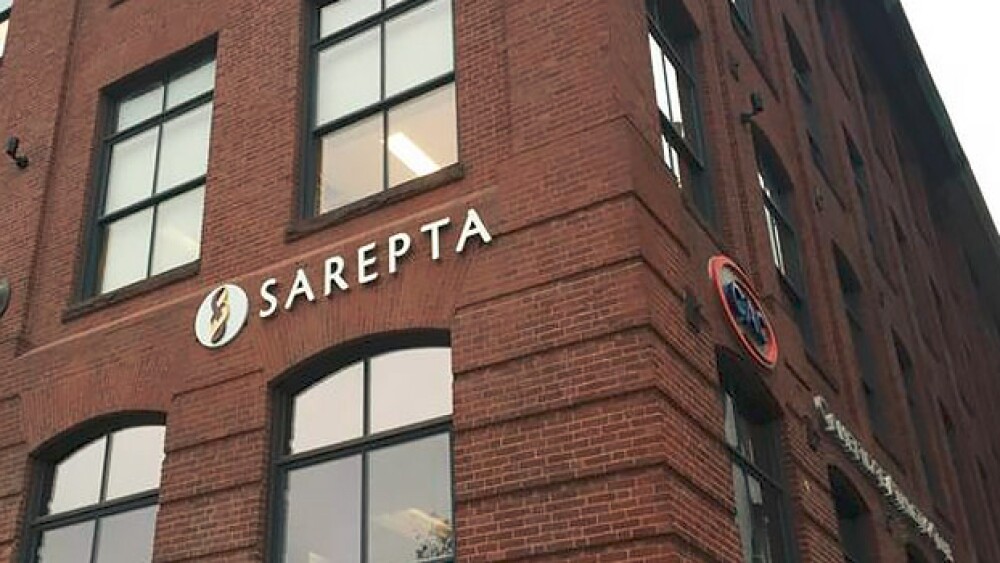The regulatory agency expressed concern regarding the risk of infections related to intravenous infusion ports and renal toxicity seen in pre-clinical models of golodirsen and observed following administration of other antisense oligonucleotides, Sarepta said.
Shares of Sarepta Therapeutics continue to fall in premarket trading after the company announced late Monday that the U.S. Food and Drug Administration (FDA) rejected the company’s Duchene Muscular Dystrophy (DMD) treatment, golodirsen.
Sarepta said the FDA issued a Complete Response Letter regarding its New Drug Application that was requesting accelerated approval of the golodirsen injection in DMD patients with a confirmed mutation amenable to exon 53 skipping. Sarepta was anticipating that golodirsen would be the company’s second approved treatment for DMD.
Sarepta sought approval based on results from 4053-101, a Phase I/II study that assessed the safety, tolerability pharmacokinetics and efficacy of golodirsen in 25 boys with confirmed deletions of the DMD gene amenable to exon 53 skipping. The trial demonstrated statistically significant results in favor of golodirsen on all biological endpoints, including properly exon-skipped RNA transcript using reverse transcription polymerase chain reaction, quantity of dystrophin expression using Western blot and dystrophin intensity pursuant to immunohistochemistry, Sarepta said.
In the CRL, the FDA pointed to two concerns about the treatment. The regulatory agency expressed concern regarding the risk of infections related to intravenous infusion ports and renal toxicity seen in pre-clinical models of golodirsen and observed following administration of other antisense oligonucleotides, Sarepta said. In its announcement, Sarepta said renal toxicity with golodirsen was observed in pre-clinical models at doses that were ten-fold higher than the dose used in clinical studies. However, the Cambridge, Mass.-based company said renal toxicity was not observed in Study 4053-101, on which the application for golodirsen was based.
Doug Ingram, president and chief executive officer of Sarepta, said the company was surprised to have received the CRL. Throughout the course of review with the FDA, Ingram said the regulatory agency did not raise any issues that would suggest “the non-approvability of golodirsen,” including those issues that were raised in the letter. Ingram said the company will immediately request a meeting with the FDA to determine next steps.
“We will work with the division (the FDA’s Division of Neurology Products) to address the issues raised in the letter and, to the fullest extent possible, find an expeditious pathway forward for the approval of golodirsen. We know that the patient community is waiting,” Ingram said in a statement.
Golodirsen is a phosphorodiamidate morpholino oligomer engineered to treat DMD patients who have genetic mutations subject to skipping exon 53 of the dystrophin gene. This is comparable to the company’s Exondys 51, which was the first drug approved by the FDA for DMD. Exondys 51 skips exon 51 and golodirsen is designed to skip exon 53 of the DMD gene. Exon skipping is intended to allow for production of an internally truncated but functional dystrophin protein. The mutated exon 53 shows up in about 8 percent of DMD patients, which is the subgroup of DMD patients golodirsen was anticipated to serve.
DMD is associated with specific errors in the gene that codes for dystrophin, a protein that plays a key structural role in muscle fiber function. Progressive muscle weakness in the lower limbs spreads to the arms, neck and other areas. Eventually, increasing difficulty in breathing due to respiratory muscle dysfunction requires ventilation support, and cardiac dysfunction can lead to heart failure. One of the most common fatal genetic disorders, DMD affects approximately one in every 3,500 boys born worldwide. The condition is universally fatal, and death usually occurs before the age of 30.
Sarepta’s stock fell 3% on Monday to close at $120.31. This morning, share prices are down more than 17% in premarket trading.
The Phase III ESSENCE study, assessing the efficacy and safety of golodirsen and casimersen, Sarepta’s exon-45 skipping agent, is ongoing. This trial had been expected to serve as a post-marketing study for golodirsen.





